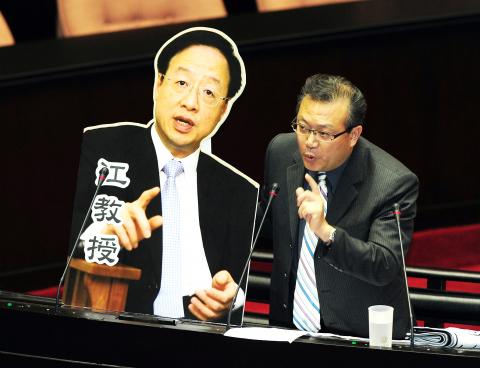After obstructing proceedings on the legislative floor on April 25 and on Tuesday, the Democratic Progressive Party (DPP) yesterday agreed to refer the draft bill for a special statute on a referendum on the Fourth Nuclear Power Plant to a standing committee for deliberation, rather than a direct second reading on the legislative floor.
As the Chinese Nationalist Party (KMT) continues to insist that the government’s resolution to suspend the construction of the plant in New Taipei City’s Gongliao District (貢寮) is not a major policy change and thereby refuses the DPP’s request that Premier Jiang Yi-huah (江宜樺) deliver a special report on the issue to the legislature, a cross-party negotiation again failed to reach a consensus.
Following the DPP’s compromise to add the budget report on the powser plant to the agenda of next Wednesday’s Economics Committee meeting, Jiang took to the podium for a question-and-answer session yesterday.

Photo: Lo Pei-der, Taipei Times
DPP Legislator Wu Ping-jui (吳秉叡) said the Executive Yuan would need to elucidate on the plant’s budget “for the controversy to come to an official end.”
KMT caucus whip Lin Hung-chih (林鴻池) said the ruling party had been clear that construction at the plant is to “be suspended and the No. 1 reactor sealed” and that the DPP could question the premier during the question-and-answer session instead of requiring a special report.
DPP Legislator Su Chen-ching (蘇震清) called the Executive Yuan’s talk of “concession” into question, saying that if its resolution is not a major policy change, but merely “one that follows the conclusion reached by a cross-party negotiation in the legislature in February” as Jiang has said, “how is this a concession made on the part of the government?”
Jiang said that the difference lies in the time frame for a possible referendum. While the negotiation considered the possibility of a referendum being held immediately after the safety inspection is completed, “the latest resolution has decided to seal the No. 1 reactor in order to wait for a possible referendum in the future.”
The cross-party negotiation concluded that no additional budget would be added for the fuel rods to be inserted until a referendum has been held, he said.
Both Su and DPP Legislator Chiu Yi-ying (邱議瑩) also brought up the fact that Jiang had refused to vote in a referendum on the issue of arms procurement in 2004.
As the nation’s existing regulations on referendums require the participation of half of eligible voters for it to be valid, mobilizing people not to vote can be a convenient way to veto the proposition proposed. How the proposition is phrased, as in affirmative or negative statement, can be decisive, they said.
Jiang said he did not vote in 2004 because he believed the referendum, as well as the proposition, was “nonsense.”
Chiu said Jiang’s refusal to vote exemplified the problem of the existing referendum threshold, by which a referendum can be easily manipulated.
DPP Legislator Pan Men-an (潘孟安) asked Jiang about the possibility of differentiating referendums on the constitutional level from those pertaining to public policies.
Jiang said that the referendum prerequisites for controversies on the constitutional level “are even more rigorous” and said that the issue of the threshold could be discussed for a local referendum, but that the restrictions for a national referendum should not be relaxed.

Taiwan would welcome the return of Honduras as a diplomatic ally if its next president decides to make such a move, Minister of Foreign Affairs Lin Chia-lung (林佳龍) said yesterday. “Of course, we would welcome Honduras if they want to restore diplomatic ties with Taiwan after their elections,” Lin said at a meeting of the legislature’s Foreign Affairs and National Defense Committee, when asked to comment on statements made by two of the three Honduran presidential candidates during the presidential campaign in the Central American country. Taiwan is paying close attention to the region as a whole in the wake of a

President William Lai (賴清德) has appointed former vice president Chen Chien-jen (陳建仁) to attend the late Pope Francis’ funeral at the Vatican City on Saturday on his behalf, the Ministry of Foreign Affairs said today. The Holy See announced Francis’ funeral would take place on Saturday at 10am in St Peter’s Square. The ministry expressed condolences over Francis’ passing and said that Chen would represent Taiwan at the funeral and offer condolences in person. Taiwan and the Vatican have a long-standing and close diplomatic relationship, the ministry said. Both sides agreed to have Chen represent Taiwan at the funeral, given his Catholic identity and

Chinese Nationalist Party (KMT) Chairman Eric Chu (朱立倫), spokeswoman Yang Chih-yu (楊智伃) and Legislator Hsieh Lung-chieh (謝龍介) would be summoned by police for questioning for leading an illegal assembly on Thursday evening last week, Minister of the Interior Liu Shyh-fang (劉世芳) said today. The three KMT officials led an assembly outside the Taipei City Prosecutors’ Office, a restricted area where public assembly is not allowed, protesting the questioning of several KMT staff and searches of KMT headquarters and offices in a recall petition forgery case. Chu, Yang and Hsieh are all suspected of contravening the Assembly and Parade Act (集會遊行法) by holding

Lawmakers from the Democratic Progressive Party (DPP) yesterday established a friendship group with their counterparts in Ukraine to promote parliamentary exchanges between the two countries. A ceremony in Taipei for the Taiwan-Ukraine Parliamentary Friendship Association, initiated by DPP Legislator Chen Kuan-ting (陳冠廷), was attended by lawmakers and officials, including Deputy Minister of Foreign Affairs Francois Wu (吳志中) and European Economic and Trade Office in Taiwan Director Lutz Gullner. The increasingly dire situation in Ukraine is a global concern, and Taiwan cannot turn its back when the latter is in need of help, as the two countries share many common values and interests,